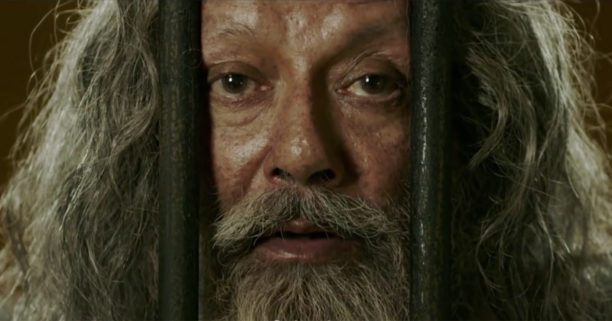 Saadat Hassan (Vinay Pathak, whose character’s name serves as a nod to the author who wrote the story the film is based on) arrives at the Lahore Mental Hospital in 1947, just prior to Partition and the subsequent independence of India and Pakistan. He serves both as a narrator of events outside the hospital, and a witness to events inside it.
Saadat Hassan (Vinay Pathak, whose character’s name serves as a nod to the author who wrote the story the film is based on) arrives at the Lahore Mental Hospital in 1947, just prior to Partition and the subsequent independence of India and Pakistan. He serves both as a narrator of events outside the hospital, and a witness to events inside it.
Ketan Mehta (perhaps best known for Mirch Masala and Bhavni Bhavai)’s film is an adaptation of Saadat Hassan Manto’s short story, “Toba Tek Singh”, which deals with the exchange of the patients of a mental institution several years after Partition. The Lahore Mental Hospital’s most curious inmate is Bishan Singh (Pankaj Kapur), a man who never sits, never lies down, and who, it is said, has not slept for ten years. Bishan Singh, generally quiet, does, nevertheless, have a bit of nonsense that he babbles every so often, and his babbling generally ends with the question, “Where is Toba Tek Singh?” This results in the other inmates and the hospital staff generally referring to him as Toba Tek Singh, after the place where he is from.
Manto’s story is, of course, a metaphor for the madness of Partition, and it requires us to ask the question: which is more mad, the world outside the lunatic asylum, a world that ripped families apart and resulted in incredible violence on a mass scale? Or the world within the asylum, which, despite its absurdities, at least seems to be a bit of a refuge for those who are there. In one very moving scene, a woman who was found at the train station is brought to the hospital. She has obviously been attacked and raped, and she is speechless and in shock. The inmates begin to ask about her religion: is she Muslim? Is she Sikh? Is she Hindu? “What does it matter?” is the answer – she’s a girl, and that’s all that matters.
On the day of the inmate exchange – the decision has been made that Muslim inmates will remain at the institution and Sikh and Hindu ones will be transferred to a hospital in India – Bishan Singh finally gets an answer to his constant and persistent question regarding the location of Toba Tek Singh. It’s in Pakistan, he’s told, causing him to become agitated and try to return to the Pakistani side of the border. Saadat Hassan has them leave him be while the exchange continues, with Bishan Singh standing on the small strip of no-man’s land between the barbed-wire fences that separate the two countries. At daybreak, Bishan Singh finally screeches his bit of gibberish one more time, and then falls down dead. Toba Tek Singh, it would seem, is a place that is neither here, nor there; neither in India, nor in Pakistan. It exists only in a place that no longer exists.
The film is anchored by two very fine performances: first, from the always reliable Vinay Pathak as the institution’s director, a gentle man who treats the inmate with utmost respect. He is moved by the events that overwhelm them all, even as he stands as a witness to them. Pankaj Kapur has very little dialogue beyond his bits of gibberish and his quest to find the location of Toba Tek Singh, but he manages to express Bishan Singh’s confusion and agitation and loss of identity, while giving this madman some small shreds of dignity.
Manto’s story and Mehta’s film adaption are both incredibly moving testaments to the heartbreak of Partition – to the questions of identity and the scars they leave, and the utter absurdity of living in one country one day, and another the next, simply because someone drew a random line on a map. It is a fitting film to close the London Indian Film Festival 2016.








